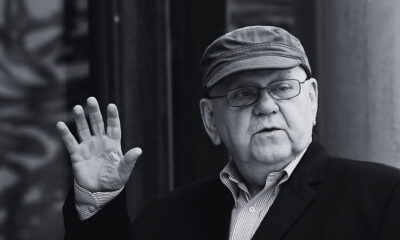Bosznia
BOSZNIAI KORMÁNYALAKÍTÁS Átestek a biztonsági vizsgálaton, mehetnek a kormányba

Hamarosan megalakulhat Borjana Krišto kormánya. A kormányalakítás előtt a bosznia-hercegovinai Állami Nyomozó és Védelmi Hivatal (Držvna Agencijaza Istrage i Zaštitu, SIPA) elvégezte a Borjana Krišto által összeállított kormányzati névsorban szereplő személyek ellenőrzését. A vizsgálat nem tárt fel összeférhetetlenségi problémákat, illetve biztonsági kockázatot, így a boszniai parlament a következő két hétben szavazhat a jelöltek személyéről.
Borjana Krišto leadta a neveket
A bosznia-hercegovinai közjogi hagyományoktól nem áll távol, hogy az országos választást követően majd hat hónapot kell várni az új kormány megalakulására, a tavaly október 2-án megtartott voksolás eredményének kihirdetését követően msot auonban rekord sebességgel zajlottak a koalíciós tárgyalások.
A szerb Milorad Dodik vezette Független Szociáldemokraták Szövetsége (Savez Nezavisnih Socijaldemokrata, SNSD) és a Dragan Čović vezette bosznia-hercegovinai Horvát Demokratikus Közösség (Hrvatska Demokratska Zajednica Bosne i Hercegovine, HDZ BiH) alig két hónap alatt megállapodott a minisztériumok felosztásáról a baloldali és multietnikus pártokat tömörítő Nyolcak (Osmorka) vezetőivel.

Borjana Krišto lassan befejezi a kormányalakítást (Forrás: HDZ BiH)
Ennek eredményeként tavaly decemberben az államelnökség javaslata alapján a boszniai parlament alsó háza megszavazta a HDZ BiH sorait erősítő Borjana Krištot a boszniai kormány szerepét betöltő Miniszterek Tanács (Vijeća Ministara) elnöklő miniszterének, vagyis ő lesz a kormányfő. Ettől számítottan Krištonak 30 napja volt, hogy a parlamentnek beterjessze jóváhagyásra a miniszterek névsorát.
A korábbi hetekben rendre jelentek meg a helyi sajtóban hírek a lehetséges jelöltek személyéről, azonban a végleges névsorra mostanáig kellett várni.
A jelöltek biztonsági ellenőrzését elvégző SIPA minap közzétett jelentése alapján nem merült fel egyikükkel szemben sem biztonsági kockázat, így a boszniai-hercegovinai parlament az alábbi névsor alapján szavazhat két héten belül Borjana Krišto kabinetjéről.
A bosnyák jelölteket kritizálják
A tárcák koalíciós partnerek közti megosztása már január 1-re ismert volt, azonban a konkrét jelöltek személye kapcsán sokáig komoly ködésítés zajlott a pártok részéről.
A minisztériumi helyek kapcsán kialakult vita miatt időközbe Hatokra (Šestorka) fogyatkozott Nyolcak Elmedin “Dino” Konakovićtyot, a jobbközép Nép és Igazságosság (Narod i Prvda, NP) párt elnökét jelölték külügyminiszternek.
A nemzetközi kosárlabda karrierrel és háborús veterán múlttal büszkélkedő Konaković jelöltsége osztotta meg leginkább a szavazókat. Sokan elégtelennek tartják a jelölt szakmai felkészültségét és sportmenedzseri végzettségét ahhoz, hogy egy ilyen bonyolult külpolitikai helyzetben lévő ország külügyeit irányítsa.
Kapcsolódó cikk
A miniszteri posztot eddig betöltő Bisera Turković (SDA) az Izetbegović családhoz fűződő szoros kötődése és a közel-keleti olaj monarchiák vezetőivel kiépített kapcsolati hálója miatt megosztó személyiséggé vált Boszniában, a majd harminc éves diplomáciai tapasztalata miatt azonban senki sem kérdőjelezte meg a szakmai alkalmasságát.
A távközlési és közlekedési tárca élére jelölt Edin Forto, a baloldali Mi Pártunk (Naša Stranka, NS) elnökének személye kapcsán ugyanez a kritika fogalmazódott meg. A közvélemény szerint kérdéses, hogy a sokszor “áldatlan” jelzővel illethető boszniai távközlési és közlekedési viszonyokon mennyiben tud javítani egy újságírói végzettséggel rendelkező személy.
A Šestorka jelöltjei közül egyedül Zukan Helez (SDP) nem kapott kritikát, aki a védelmi miniszteri posztra jelöltek. Helez kapcsán is felvetődött, hogy pedagógusként mennyiben lehet alkalmas a hadsereg vezetésére, amire az SDP mentő kommunikációs lépése az volt, hogy leporolták a jelölt négyéves jugoszláv háborús múltját. Erre hivatkozva legalább azt lehetett kommunikálni, hogy ő legalább már látott katonát, és nem is akármilyen időkben.
Az elmezői vélemények szerint a Šestorka a jelöltekkel komoly öngólt rúghat, amennyiben azok szakmai alkalmatlansága a hivatalba lépésüket követően is felmerül. Ugyanis mind Konaković, mind Forto egyben pártelnök is, így a gyenge miniszteri szereplés kihathat a pártok támogatottságára.
Dodik és a kormányalakítás
Az SNSD jelölteji kapcsán egyedül a biztonsági miniszteri poszt volt sokáig kérdéses. Staša Košarac (SNSD) külkereskedelmi és gazdasági miniszteri helye biztos volt, tekintettel arra, hogy ezt a posztot töltötte be a most leköszönő kormányban is. Párttársa, Zoran Tegeltija az előző kormányban az elnöklő miniszteri posztért felelt, most Milorad Dodik pénzügyminiszternek jelöltette öreg harcostársát.
A legnagyobb meglepetést a teljes névsorban a Demokratikus Népi Szövetség (Demokratski Narodni Savez, DNS) elnökének, Nenad Nešićnek a biztonsági miniszteri posztra való jelölése okozta. Nešić az előző ciklusban meglehetősen viharos körülmények között lépett ki az SNSD vezette boszniai szerb kormányból. Akkor mindenki azzal számolt, hogy a DNS tartósan ellenzéki szerepre törekszik.
Dodik maga nem kommentálta Nešić jelölését, és azt a parlamenti matematika alapján is nehézkes indokolni, mert az SNSD-nek a négy koalíciós partnerével komoly többsége van a boszniai szerb törvényhozásban.
Kapcsolódó cikk
Felgyújtották a boszniai biztonsági miniszternek jelölt Nenad Nešić öccsének autóját
Korábbi cikkünkben írtunk arról, hogy a háborús veterán és korábbi rendőrtiszt Nešić testvérének autóját pár nappal azt követően gyújtották fel Kelet- Szarajevóban, hogy a DNS elnökének jelöltségét közölték a sajtóban.
Akkor Nešić maga arra kérte a rendőri szerveket, hogy keressék meg az elkövetőt, míg testvére az anyjuk életére is megesküdött arra vonatkozóan, hogy nem ismert előtte az indíték. A nyomozást a rendőrség piromániás személy által elkövetett gyújtogatás gyanúja miatt indította meg, vagyis el akarták kerülni, hogy az ügy politikai összefüggést kapjon.
A HDZ BiH fiatalít

A HDZ BiH két teljesen új párttagot jelölt a koalíciós kormányba. A korábban HDZ BiH-es színekben Ankica Gudeljević által vezetett tárcát a tervek szerint a nevével ellentétben horvát Dubravka Bošnjak veszi át, míg az igazságügyi miniszteri beosztást a fiatal mostari sztárügyvéd, Davor Bunoza kapja meg.
Az egyéb (ostali) nemzetiségek kvótájára fenntartott miniszteri posztra a párton kívüli Sevlid Hurtićot jelölték, aki az emberi jogi és menekültügyi tárca várományosa.
-

 Szerbia6 nap telt el azóta
Szerbia6 nap telt el azótaA jelek szerint Szerbia nemcsak Ukrajnának, hanem Izraelnek is szállít fegyvert 🇮🇱🤝🇷🇸
-

 Szerbia6 nap telt el azóta
Szerbia6 nap telt el azótaMagyarország nem támogatja Koszovó ET-tagságát, sem a Srebrenicáról szóló ENSZ-határozatot
-

 Szerbia5 nap telt el azóta
Szerbia5 nap telt el azótaCsapást mérhet-e a szerb Panda a kínai elektromos autókra?
-

 Szerbia3 nap telt el azóta
Szerbia3 nap telt el azótaVitték, mint a cukrot: Szabadkán ezernél is több ingatlan kelt el egy év alatt
































































